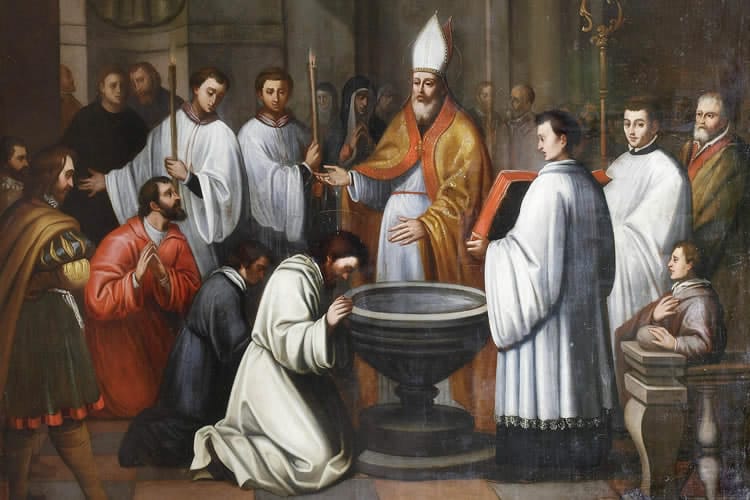Throughout his life, there is no doubt that each time St Augustine celebrated Easter, he never failed to remember the night of 24th/25th April in the year 387, when he had been baptised and had put on Christ to become a new creature in God. The words in the writings of the Apostle St Paul, which he had read in the garden of Milan in obedience to the voice that told him ‘Tolle, legge’ (pick up and read), thereby became a reality, for in that text he had received the invitation to “give up all the things we prefer to do under cover of the dark and arm ourselves and appear in the light”. (Rm 13:12-13)
Baptismal theology, and the invitation to faithfully live out the call to holiness received in baptism, were to be present in his homilies and in his writings. The same would apply to his thoughts about the Easter celebration, and particularly its yearly commemoration, not because Christ has to die many times, but rather because each year the faithful make present this memory, so as not to forget the centrality of the mystery of the resurrection of Christ in the life of believers. In this way, something that happened once and for all is repeated every year to give new life both to the memory of that event, and to the faith of believers: “The yearly recurrence of the solemnity is the same as a re-enacting of that which Christ the Lord suffered for us once and for all in his death. That which only happened once in history for the renewal of our life is celebrated every year to perpetuate the memory of it”. (Sermon 206,1)
For St Augustine, Easter was the festival of life. The one who believes is called to die to his life of sin, to rise with Christ to the fullness of a new life. This is why, in one of his Easter sermons,St Augustinestates that it is necessary to die both to the former man and to sin, in order to be able to live in Christ. It is only in this way that, when we come to face our bodily death, we will truly be able to live with God: “You believed and you have been baptised; the old life died, put to death on the cross, and buried in baptism. The old life has been buried, the life in which you lived badly; may the new life come to life. Live well; live for life; live so that when you eventually die, you will not die”. (S.229 E,3)
Another aspect of Easter for St Augustineis as the liturgical time in which we bring forward the joy of eternal life with God. It is the time of singing Alleluia, that is, “praise God!”, and that very praise will be the chief concern of the blessed ones in eternal life: “With reason, my brothers, does the Church maintain the ancient tradition of singing the Alleluia during these fifty days. Alleluia and praise to God are the same thing. With it, what we will be doing in our time of rest is symbolically anticipated for us in the midst of our troubles. When, after our present labours, we come to him, our only concern will be to praise God; all our activity will be distilled into the Alleluia. And what does Alleluia mean? Praise God”. (s.252,9)
Easter is a symbol of eternal life with God, where the human being will be able to enjoy God and to praise him for all eternity. It is therefore a time of hope and comfort, in which the liturgy mysteriously anticipates the eternal joy of Heaven, where man will be able to love, praise, and contemplate God, and finally come to rest. This was pointed out by St Augustinein one of his Easter sermons, prefiguring in a way the well-known words with which he ended his work The City of God: “ Let us make of these days a symbol of that day without end. Let us make of this mortal place a symbol of time without end. Let us hurry to get to the eternal house. Blessed are those who live in your house, Lord; they will praise you for ever and ever. Thus says the law, the Scriptures, and the Truth: we are meant to arrive at the house of God, that is, Heaven. There we will praise God, not for fifty days but – as it is written- for ever and ever. We will see him, we will love him, and we will praise him; neither shall sight vanish, neither shall love run out, neither shall praise fall silent; everything shall be eternal, nothing shall come to an end”. (s.254,8)
Alleluia becomes for St Augustinea viaticum for the traveller and pilgrim of the city of God. Being able to sing the Alleluia in this present time is both incentive and goad to continue on the path of joy, despite difficulties and problems, in the knowledge that the everlasting Kingdom and everlasting life with God await us. Alleluia is therefore a song of pilgrims, of those en route, who know that this earth offers no permanent dwelling-place and who face towards God: “In this time of our pilgrimage, we too sing Alleluia as viaticum for our solace; at present, Alleluia is for us a travellers’ song. We head out on a difficult path towards our homeland, a place of peace where, all our worries having been laid aside, nothing but the Alleluia will remain for us”. (s.255,1)
The fifty days of the Easter season were certainly interpreted by St Augustinein a symbolic manner, as the total of forty days representing the labours and the weariness of this present life, to which are added ten days representing the denarius promised to the labourers who work faithfully and with perseverance in the vineyard of the Lord. The Easter season therefore has for St Augustine a profound eschatological meaning, something repeated in many of his sermons: “ But once we have lived the number forty in a holy manner, in other words, once we have lived in a holy manner this mortal life, walking in the way of the precepts of God, we will receive as wages the denarius due to the faithful(…) So, add the denarius that is the wages to the number forty lived in a holy manner, and this comes to fifty, which symbolizes the future Church, where God will be praised for ever” (s.252,11)
Within this Easter symbolism, if the fifty is multiplied by three, the number of the Trinity, and to this is added three, one gets 153, the number of fish caught by the disciples after the resurrection of Christ, in the miraculous catch of fish: “In addition, as we have all been called to live a holy life in the number forty in the name of the trinity and to receive the denarius, multiply the number fifty by three and you will get 150. Add to this the very mystery of the Trinity and it comes to 153, the number of fish that were caught on the right-hand side”. (s.252,11)
Finally for St Augustine, Easter is, among many other things we could highlight, a time of joy and happiness, of knowing that death is not the end, rather that after death comes life and resurrection. St Augustine therefore points out that the fifty days of Easter are a time of joy and happiness which inundate the whole being of the one who believes: “These days that follow on from the Passion of our Lord, during which we sing Alleluia to God, are for us days of celebration and of happiness”. (s.228,1)


